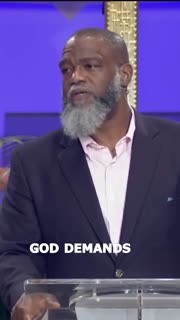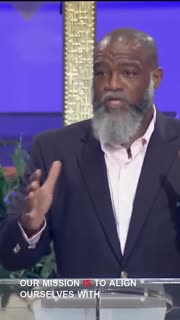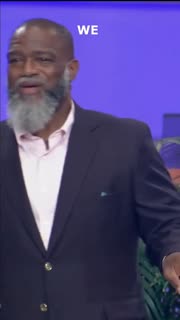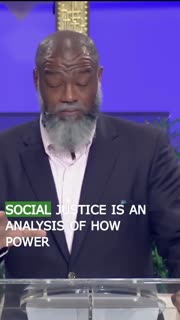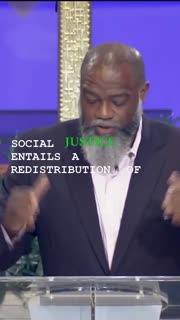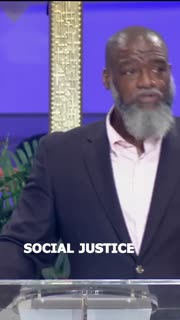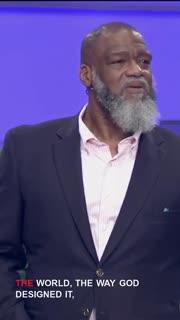Understanding the Divide: Social Justice vs. Biblical Justice
Devotional
Sermon Summary
Bible Study Guide
Sermon Clips
### Quotes for Outreach
1. "God demands justice from his people. And so it is imperative that we understand what justice is, because injustice is sin. Amen? So it's imperative that we be clear about this. And that's why, as people sort of throw out this terminology and this ideology of social justice, it's important for us to understand what it is, because if social justice is justice, and injustice is sin, then we must be about the business of social justice." [05:42] (41 seconds)
2. "Our mission is to align ourselves with the law of God. Amen? That's our mission in justice, is to see to it that things align with what thus saith the Lord. That's not the mission of social justice. In fact, in order to understand the mission of social justice, you have to understand a couple of concepts." [18:05] (26 seconds)
3. "We are not about gaining political power in order to force people to do justice. We are about the proclamation of the gospel, recognizing that true justice must and can only come from hearts transformed through the person and work of Jesus Christ. Our greatest political desire is freedom to proclaim the gospel in the marketplace of ideas. Amen?" [50:28] (39 seconds)
4. "We must pursue justice. Injustice is sin. And what I've come to discover is that the difference between social justice and biblical justice, it... we've been going at it the wrong way. We've been trying to look at it. We've been trying to say, you know, here's what the Bible would say, you know, is required to do justice here. And here's what social justice would say is required to do justice here." [51:22] (31 seconds)
### Quotes for Members
1. "Social justice is an analysis of how power, privilege, and oppression impact our experience of our social identities, not the reality of our social identities, but the experience of our social identities. What you will find, by the way, is that in many of these academic disciplines, there's not much academia at all." [11:52] (34 seconds)
2. "Social justice entails a redistribution of resources from those who have unjustly gained them to those who justly deserve them. And it also means creating and ensuring the processes of truly democratic participation in decision-making. It seems clear that only a decisive redistribution of resources and decision-making power can ensure social justice and authentic democracy." [27:56] (31 seconds)
3. "Social justice defines injustice as anything that produces or allows an inequitable outcome. So for example, the parable of the talents would be injustice. In fact, God would be unjust because there's things that he hasn't done equitably. He blessed me with more melanin than most. That's inequitable. Are you taller than most people? Inequitable. More intelligent? Inequitable." [53:25] (58 seconds)
4. "The world, the way God designed it, would not qualify as socially just because it's filled with inequity. Do we want everybody to be the same height? Do we want everybody to have the same amount of melanin? The same level of intelligence? The same kind of intelligence? Do we want that? No. But that's at bottom what critical social justice is pursuing through diversity, equity, and inclusion." [54:30] (58 seconds)
5. "We see the whole idea being really brought forth and manifested in critical theory through the Frankfurt School, and eventually through the institutions and even studies and things like this. Now, what does all of that have to do with this idea of social justice? Well, it's when you get into the literature, here's what you discover. That the hegemony today, if you look, for example, at America, generally we think about the oppressor-oppressed paradigm, this very Marxist paradigm, this paradigm that says you divide all the world and all reality into oppressors and the oppressed." [21:39] (43 seconds)
Ask a question about this sermon
1. "God demands justice from his people. And so it is imperative that we understand what justice is, because injustice is sin. Amen? So it's imperative that we be clear about this. And that's why, as people sort of throw out this terminology and this ideology of social justice, it's important for us to understand what it is, because if social justice is justice, and injustice is sin, then we must be about the business of social justice." [05:42] (41 seconds)
2. "Our mission is to align ourselves with the law of God. Amen? That's our mission in justice, is to see to it that things align with what thus saith the Lord. That's not the mission of social justice. In fact, in order to understand the mission of social justice, you have to understand a couple of concepts." [18:05] (26 seconds)
3. "We are not about gaining political power in order to force people to do justice. We are about the proclamation of the gospel, recognizing that true justice must and can only come from hearts transformed through the person and work of Jesus Christ. Our greatest political desire is freedom to proclaim the gospel in the marketplace of ideas. Amen?" [50:28] (39 seconds)
4. "We must pursue justice. Injustice is sin. And what I've come to discover is that the difference between social justice and biblical justice, it... we've been going at it the wrong way. We've been trying to look at it. We've been trying to say, you know, here's what the Bible would say, you know, is required to do justice here. And here's what social justice would say is required to do justice here." [51:22] (31 seconds)
### Quotes for Members
1. "Social justice is an analysis of how power, privilege, and oppression impact our experience of our social identities, not the reality of our social identities, but the experience of our social identities. What you will find, by the way, is that in many of these academic disciplines, there's not much academia at all." [11:52] (34 seconds)
2. "Social justice entails a redistribution of resources from those who have unjustly gained them to those who justly deserve them. And it also means creating and ensuring the processes of truly democratic participation in decision-making. It seems clear that only a decisive redistribution of resources and decision-making power can ensure social justice and authentic democracy." [27:56] (31 seconds)
3. "Social justice defines injustice as anything that produces or allows an inequitable outcome. So for example, the parable of the talents would be injustice. In fact, God would be unjust because there's things that he hasn't done equitably. He blessed me with more melanin than most. That's inequitable. Are you taller than most people? Inequitable. More intelligent? Inequitable." [53:25] (58 seconds)
4. "The world, the way God designed it, would not qualify as socially just because it's filled with inequity. Do we want everybody to be the same height? Do we want everybody to have the same amount of melanin? The same level of intelligence? The same kind of intelligence? Do we want that? No. But that's at bottom what critical social justice is pursuing through diversity, equity, and inclusion." [54:30] (58 seconds)
5. "We see the whole idea being really brought forth and manifested in critical theory through the Frankfurt School, and eventually through the institutions and even studies and things like this. Now, what does all of that have to do with this idea of social justice? Well, it's when you get into the literature, here's what you discover. That the hegemony today, if you look, for example, at America, generally we think about the oppressor-oppressed paradigm, this very Marxist paradigm, this paradigm that says you divide all the world and all reality into oppressors and the oppressed." [21:39] (43 seconds)
